Can I Use a Power Washer to Wash My Car
Some people love taking care of the appearance of their cars and are willing to spend time washing and waxing the exterior, as well as detailing the inside. On the other hand, washing a car might seem like a tedious task in an already too-busy schedule, and a quick 10-minute drive through the automated car wash is about all the time you're willing to put toward cleaning your vehicle.
Whether you're a car enthusiast who washes your car weekly or someone who just wants the job done quickly, using a pressure washer is an effective and efficient method for cleaning the exterior of your car. We've outlined everything you need to know for how to use a pressure washer — and it's easier than you might think.
Step 1: Choose the appropriate pressure washer and nozzle
When washing your car, it's important to use a pressure washer with the appropriate power (PSI: pounds per square inch) and water flow (GPM: gallons per minute). The higher the PSI, the more force the water will have as it leaves the tip of the washer. The higher the GPM, the more water the washer will release.
Cleaning Units represent the combination of force and amount of water a pressure washer can produce. This is demonstrated in the equation below:
PSI x GPM = Cleaning Units
1500PSI x 2GPM = 3000 cleaning units
Washing a car with a pressure washer requires around 1,900 – 2,800 cleaning units. Pressure washers are far more efficient than garden hoses and use less water. See the table below to compare cleaning units between a hose and a pressure washer.
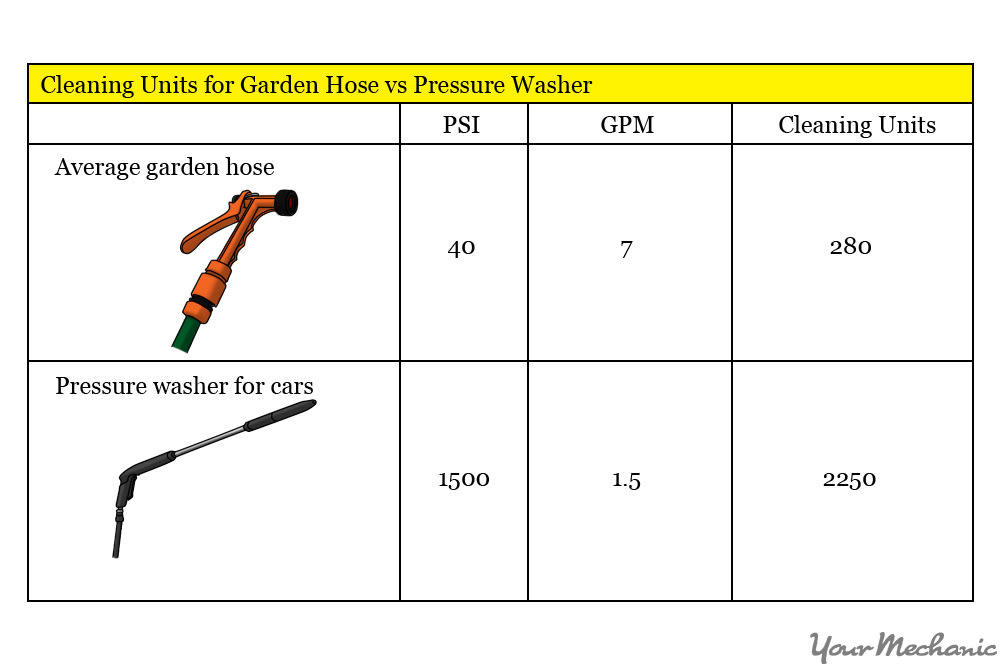
- Note: You can purchase both electric and gas-powered pressure washers. In general, gas pressure washers have a much stronger cleaning capacity and are too strong for light jobs, such as washing a car or truck. In order to avoid damaging your vehicle, it is better to use an electric pressure washer set at the appropriate PSI.
There are a number of different types of nozzles to choose from. Using the correct size is important so that your car is cleaned effectively and without damage to the paint job. There are two features to keep in mind when choosing a pressure washer for your car: pressure level and nozzle size.
Choose a pressure washer with the appropriate pressure level.
Choose a pressure washer with a setting of 1200 – 1900 PSI. It's safe to use for cars, so you won't need to worry about damaging the paint on your car. Experts recommend using a pressure washer with 1.4 – 1.6 GPM.
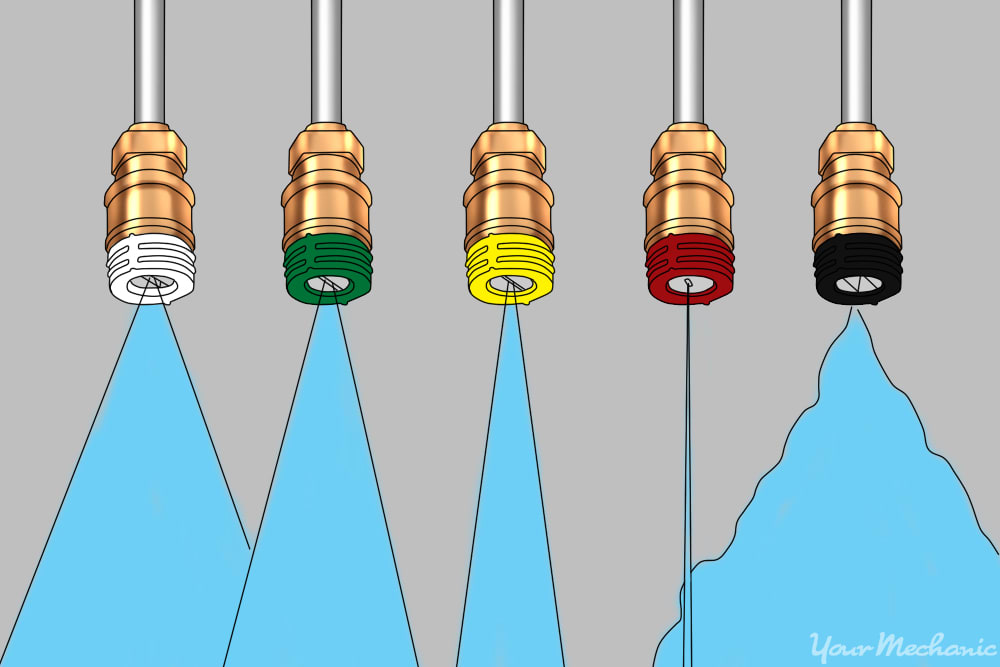
Choose the appropriate nozzles.
There are several different sizes of nozzles that can be used with a pressure washer. Choose the correct size so that water is evenly and easily distributed across the surface of your car for best washing practices.
- Tip: Narrow pressure washer tips cover less surface area but use more pressure. Wider tips cover more area but use less pressure. See table below.
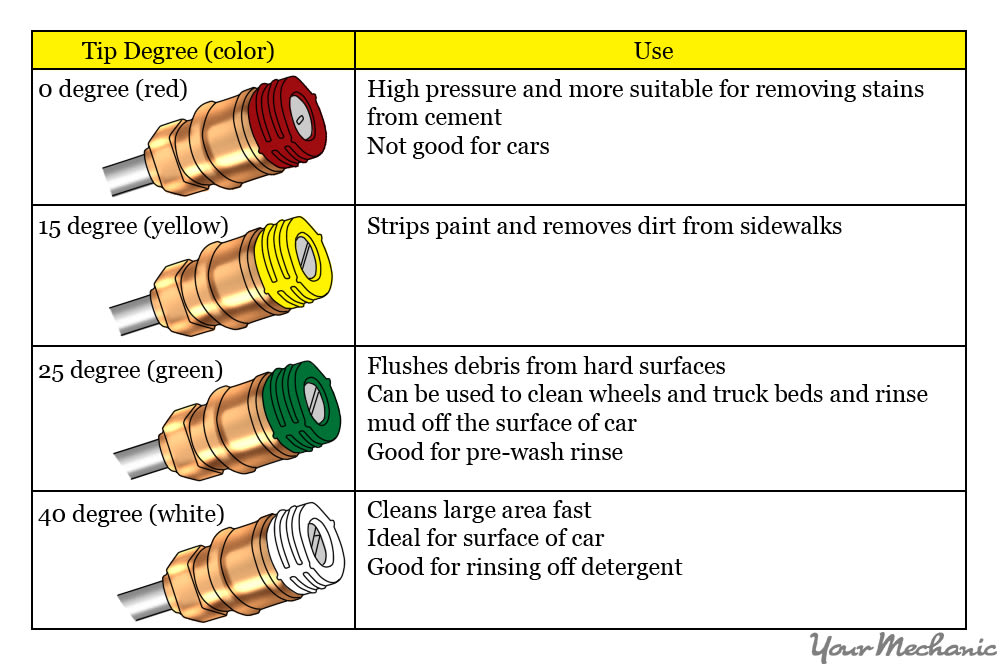
Step 2: Park car in a good spot for washing
It's important to park your car in an open space, away from other cars or objects you don't want to get wet or damaged by water. A large driveway or street is recommended. If using an electric pressure washer, be sure you have access to an outlet so that you can power your washer.
- Note: Not all electric pressure washers can be used with extension cords. Make sure you're close enough to an outlet to use your washer appropriately.
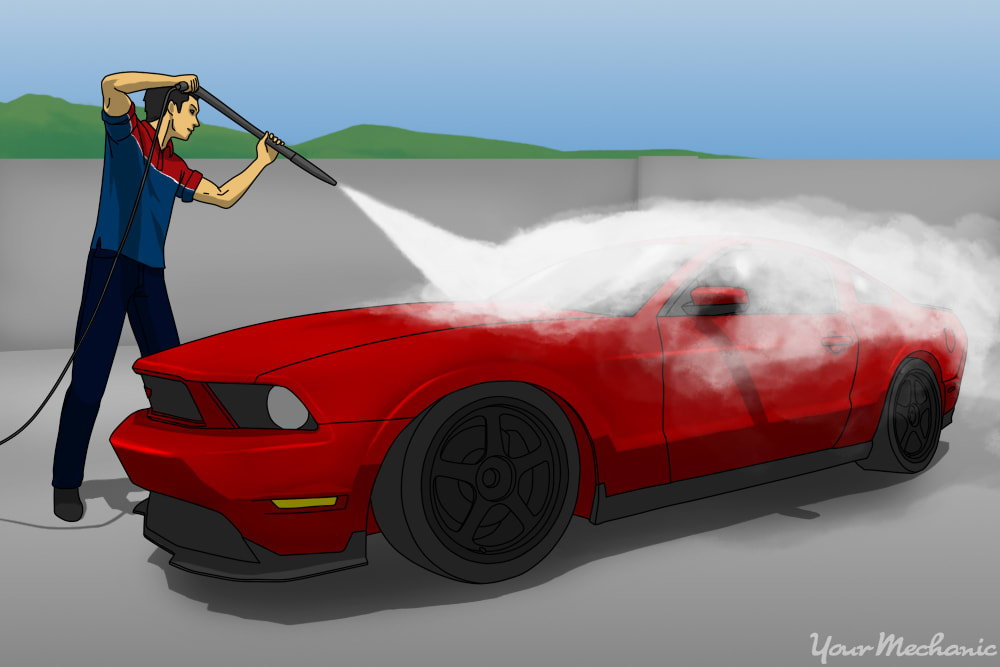
Step 3: Rinse your car
Before applying any cleaner to your car, be sure to rinse the car and spray off any mud or other debris stuck to the surface. It's a good idea to begin at 4-5 feet away from your car and move closer after testing out the pressure washer. Make sure all of your windows are rolled up and the car doors and trunk are closed so you don't get water on the interior of the car.
- Tip: Before rinsing the car, spray some water from the washer on the ground to check the pressure of the water. When using the washer on the car, try to spray the water downward on the car's surface.
Materials Needed
- Pressure washer
- Water outlet
- Electric outlet
- 25 degree tip
With these materials, adhere to the following 4 steps for rinsing your car:
-
Plug your pressure washer into its electrical source.
-
Attach your pressure washer to a water outlet.
-
Attach the 25-degree tip to the washer nozzle.
-
Turn on your pressure washer and spray water across the entire surface of the car.
Make sure to rinse the wheels as well as the entire body of the car. You may need to rinse the tires up close to make sure you can remove all of the dirt and grime from the hubcaps.
Step 4: Apply detergent to your car
Most pressure washers have special compartments for cleaning detergents. Make sure to use a cleaning detergent designed to be used with pressure washers.
- Note: Detergents are sold as concentrates and need to be diluted with water before they're applied to a car.
Materials Needed
- Pressure washer
- Detergent (1 quart)
- Water
- Bucket
- Cloth (optional)
The following 3 steps explain how to best apply the pressure-wash specific detergents:
1. Pour detergent and water into the bucket to dilute the detergent concentrate with water.
Be sure to follow the suggestions of the detergent manufacturer for the water-to-concentrate ratio.
2. Fill the detergent tank of the pressure washer with the diluted detergent.
Be sure to switch the setting on the pressure washer so you will be spraying detergent rather than water onto the car. If there is no detergent tank, apply the detergent by hand with a cloth.
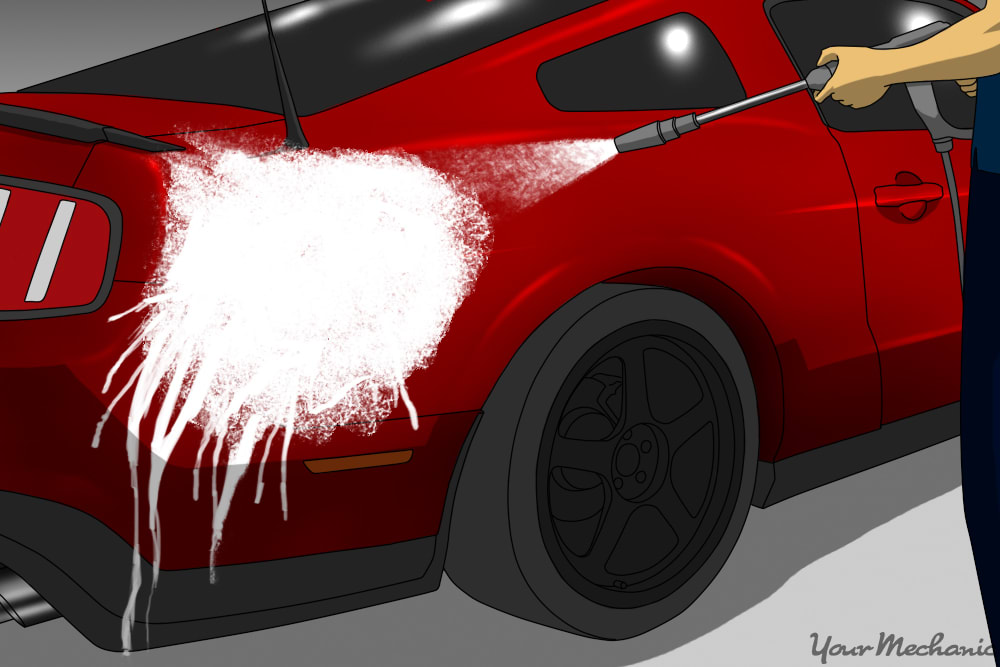
3. Spray the detergent onto your car.
Start from the top of the car and work your way down. You may choose to wash only one side of the car at a time or wash the entire car at once.
- Tip: Allow the detergent to stay on the car for about five minutes.
Step 5: Rinse detergent off of the car
Using a 40-degree tip, rinse the detergent off of the car. It's a good idea to hold the washer at a 45-degree angle and rinse downward from the top of the car.
Materials Needed
- Pressure washer
- 40-degree tip
- Towel (optional)
To rinse detergent off your car effectively, follow these 3 tips:
-
Switch the tip of the washer to the 40-degree tip.
-
Switch the output method from the detergent tank to your water source.
-
Rinse the detergent off.
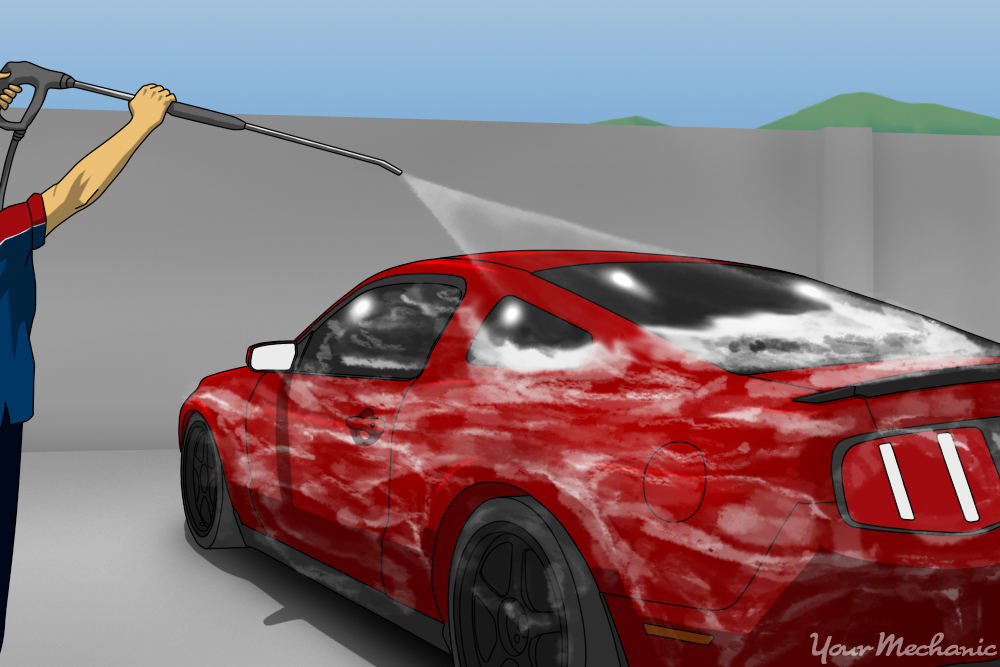
Depending on preference, a towel or soft cloth may be used to dry the car after it has been rinsed clean of detergent.
You have now successfully washed your car using a pressure washer, improving your car's appearance, and saving time and water as well. Regular washing with a pressure washer is a quick and efficient way to boost your car's visual appeal and prolong the life of your paint job. Be sure to follow these steps each time you wash your car to keep it looking its best.
The statements expressed above are only for informational purposes and should be independently verified. Please see our terms of service for more details
Can I Use a Power Washer to Wash My Car
Source: https://www.yourmechanic.com/article/how-to-clean-your-car-with-a-pressure-washer-by-patrick-haas#:~:text=Choose%20a%20pressure%20washer%20with%20a%20setting%20of%201200%20%E2%80%93%201900,Choose%20the%20appropriate%20nozzles.
0 Response to "Can I Use a Power Washer to Wash My Car"
Post a Comment